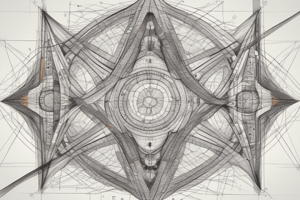Podcast
Questions and Answers
Which branch of mathematics is often referred to as 'the language of mathematics'?
Which branch of mathematics is often referred to as 'the language of mathematics'?
What type of values are represented by letters like x, y, and z in algebra?
What type of values are represented by letters like x, y, and z in algebra?
Which of the following is NOT a key concept of algebra?
Which of the following is NOT a key concept of algebra?
What type of statements are equations in algebra?
What type of statements are equations in algebra?
Signup and view all the answers
In algebra, what do inequalities compare?
In algebra, what do inequalities compare?
Signup and view all the answers
Which branch of mathematics involves the study of quantities and their relationships?
Which branch of mathematics involves the study of quantities and their relationships?
Signup and view all the answers
Study Notes
Mathematics: Exploring Algebra and Comparing Quantity
Mathematics is a vast field that encompasses various branches, including arithmetic, geometry, trigonometry, calculus, and statistics. However, two of its most fundamental aspects are algebra and comparing quantity. Let's delve into these areas by exploring their definitions, key concepts, and real-life applications.
Algebra
Algebra is often described as 'the language of mathematics'. It is a branch of math that deals with generalizations, abstractions, relations between variables, and exact computations. In simpler terms, it involves solving equations, simplifying expressions, working with unknown quantities, and manipulating symbols according to certain rules, known as the laws of algebra.
Key Concepts:
- Variables: Unknown values represented by letters such as x, y, z, etc., which you can solve for through substitution or elimination methods.
- Equations: Statements where one expression equals another; they may involve both numbers and variables.
- Inequalities: Similar to equations except they compare two expressions using >, <, >=, <= operators.
- Solving: Determining the value(s) of a variable that satisfies an equation or inequality.
- Expressions: Arithmetic combinations of constants, variables, and operations like addition, subtraction, multiplication, and division.
Real-Life Applications:
- Engineering and Technology: Engineers apply algebra when designing structures, machines, and electronics; it helps them determine how much weight components can support or what speed an engine must rev.
- Financial Planning: Banks, companies, governments, and individuals use algebraic formulas to manage money effectively.
- Sports: Athletes analyze data from races, games, and performances to improve their techniques and strategies.
- Science Research: Scientists use algebra to interpret numerical data collected during experiments.
Comparing Quantity
Comparing quantity refers to assessing the relative size of individual elements within a set, rather than measuring absolute magnitude. This concept is closely related to cardinality, which focuses on the number of elements in a set regardless of their specific values.
Key Concepts:
- Cardinality: A measure of the size of sets, counting only the presence or absence of elements without regard to their order or any other property.
- Reliability: Accurately quantifying uncertainty in comparisons due to factors such as measurement error or natural variation.
- Magnitude: Absolute numeric scale indicating the degree of some attribute, independent of context or comparison with others.
Real-Life Applications:
- Economics: Business owners evaluate profits based on annual revenue, sales per month, customer satisfaction scores, and more.
- Medicine: Healthcare professionals compare blood sugar levels, blood pressure measurements, body mass index (BMI), and cholesterol levels to diagnose diseases and monitor treatment progress.
- Environmental Studies: Ecologists study species populations, energy consumption, pollution levels, and overall ecosystem health.
In summary, mathematical understanding is essential in everyday life because it provides the foundation for critical thinking skills used across disciplines. By learning algebra and mastering the art of comparing quantities, students equip themselves with powerful tools they will need throughout their academic journeys and future careers.
Studying That Suits You
Use AI to generate personalized quizzes and flashcards to suit your learning preferences.
Description
Explore the fundamental aspects of mathematics such as algebra and comparing quantity. Learn about key concepts like variables, equations, cardinality, and magnitude. Discover real-life applications in various fields like engineering, financial planning, sports, and science research.




